
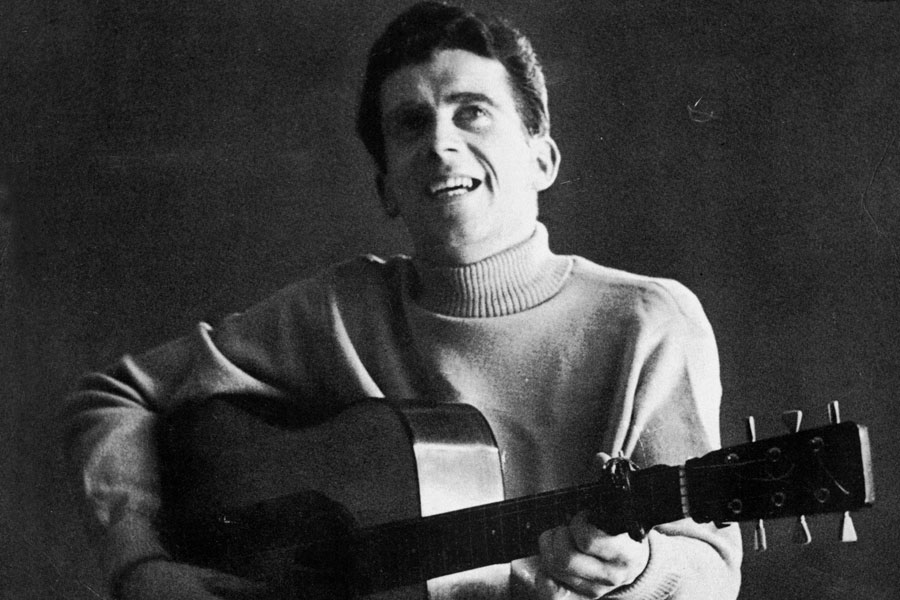
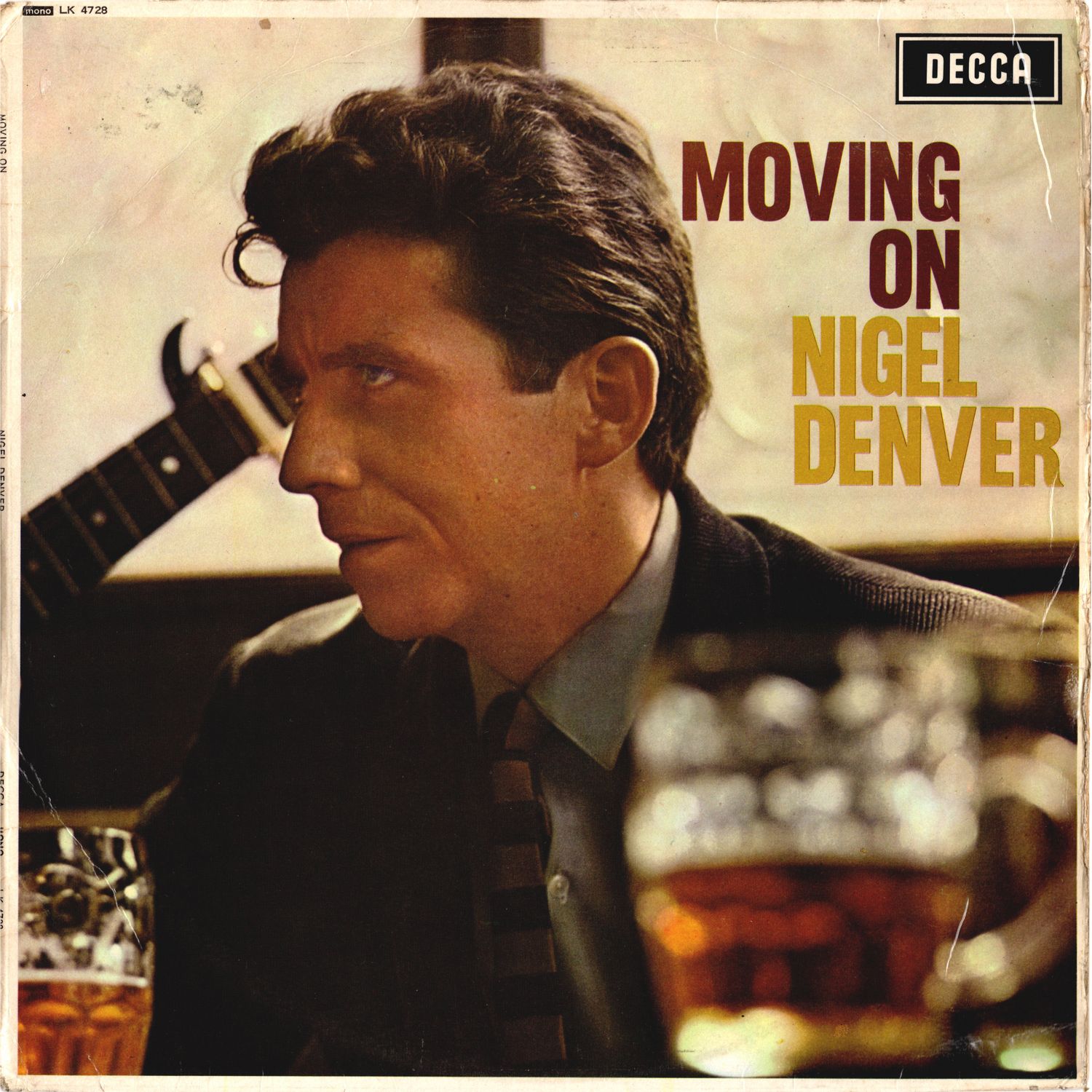 |
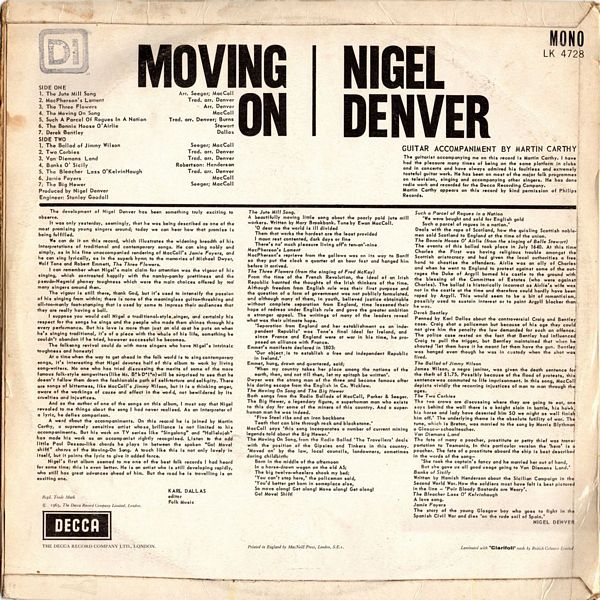
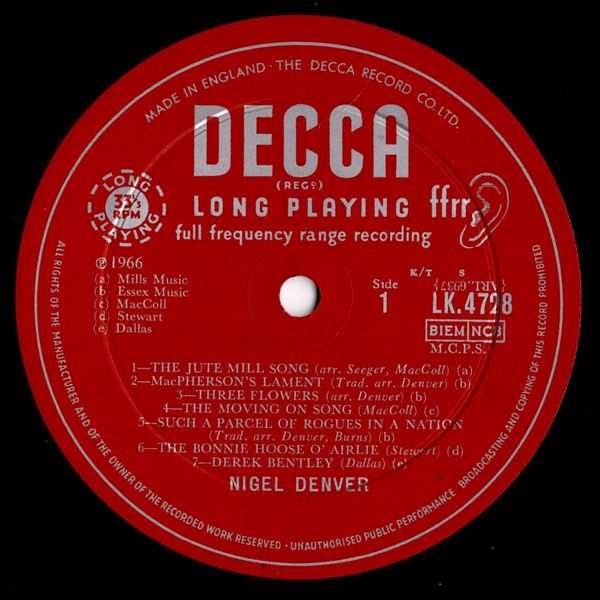
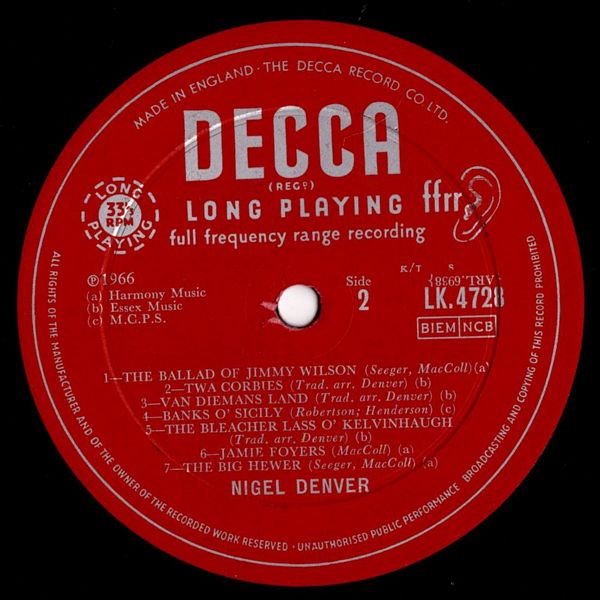 |
Sleeve Notes
The guitarist accompanying me on this record is Martin Carthy. I have had the pleasure many times of being on the same platform in clubs and in concerts and have always admired his faultless and extremely tasteful guitar work. He has been on most of the major folk programmes on television, singing and accompanying other singers. He has done radio work and recorded for the Decca Recording Company. Martin Carthy appears on this record by kind permission of Philips Records.
The development of Nigel Denver has been something truly exciting to observe.
It was only yesterday, seemingly, that he was being described as one of the most promising young singers around; today we can hear how that promise is being fulfilled.
We can do it on this record, which illustrates the widening breadth of his interpretations of traditional and contemporary songs. He can sing nobly and simply, as in his fine unaccompanied rendering of MacColl's Jamie Foyers, and he can sing lyrically, as in the superb hymn, to the memories of Michael Dwyer, Wolf Tone and Robert Emmett, The Three Flowers.
I can remember when Nigel's main claim for attention was the vigour of his singing, which contrasted happily with the namby-pamby prettiness and the pseudo-Negroid phoney toughness which were the main choices offered by too many singers around then.
The vigour is still there, thank God, but its used to intensify the passion of his singing from within; there is none of the meaningless guitar-thrashing and all-too-manly foot-stamping that is used by some to impress their audiences that they are really having a ball.
I suppose you would call Nigel a traditional-style singer, and certainly his respect for the songs he sings and the people who made them shines through his every performance. But his love is more than just on old coat he puts on when he's singing traditional, it's of a piece with the whole of his life, something he couldn't abandon if he tried, however successful he becomes.
The folksong revival could do with more singers who have Nigel's intrinsic toughness and honesty!
At a time when the way to get ahead in the folk world is to sing contemporary songs, it's Interesting that Nigel devotes half of this album to work by living song-writers. No one who has tried discussing the merits of some of the more famous folk-style songwriter (like Mr. B*b D*l*n) will be surprised to see that he doesn't follow them down the fashionable path of self-torture and self-pity. There are songs of bitterness, like MacColl's Jimmy Wilson, but it is a thinking anger, aware of the workings of cause and effect in the world, not bewildered by its cruelties and injustices.
And as the author of one of the songs on this album, I must say that Nigel revealed to me things about the song I had never realised. As an interpreter of a lyric, he defies comparison.
A word about the accompaniments. On this record he is joined by Martin Carthy, a supremely sensitive artist whose, brilliance is not limited to his accompaniments. But his work on TV series like "Singalong" and "Hallelujah" has made his work as an accompanist rightly recognised. Listen to the odd little Paul Dessau-like chords he plays in between the spoken "Go! Move! shift!" chorus of the Moving-On Song, A touch like this is not only lovely in itself, but it points the lyric to give it added force.
Nigel's first album seemed to me one of the best folk records I had heard for some time; this is even better. He is an artist who is still developing rapidly, who still has great advances ahead of him. But the rood he is travelling is an exciting one.
Karl Dallas
Editor Folk Music
The Jute Mill Song
A beautifully moving little song about the poorly paid jute mill workers. Written by Mary Brookbank. Tune by Ewan MacColl.
O dear me the world is ill divided
Them that works the hardest are the least provided
I maun rest contented, dark days or fine
There's no much pleasure living aff'n ten-an'-nine
MacPhersons Lament
MacPherson's reprieve from the gallows was on its way to Banff so they put the clock a quarter of an hour fast and hanged him before it arrived.
The Three Flowers (from the singing of Fred McKoy)
From the time of the French Revolution, the ideal of an Irish Republic haunted the thoughts of the Irish thinkers of the time. Although freedom from English rule was their first purpose and the question of a form of government was not publicly formulated, and although many of them, in youth, believed justice obtainable without complete separation from England, time lessened their hope of redress under English rule and gave the greater ambition a stronger appeal. The writings of many of the leaders reveal what was their ultimate hope.
"Separation from England and her establishment as an Independent Republic"
was Tone's final Ideal for Ireland, and since France and England were at war in
his time, he proposed an alliance with France.
Emmet's manifesto declared in 1803:
"Our object Is to establish a free and independent Republic in Ireland."
Emmet, hung, drawn and quartered, said:
"When my country takes her place among the nations of the earth,
then, and not till then, let my epitaph be written".
Dwyer was the strong man of the three and became famous after his daring escape from the English in Co. Wicklow.
The Moving On Song and The Big Hewer — Both songs from the Radio Ballads of MacColl, Parker & Seeger.
The Big Hewer, a legendary figure, a superhuman man who exists to this day for some of the miners of this country. And a superhuman man he was Indeed.
"Five Steel ribs and on iron backbone
Teeth that can bite through rock and blackstone."
MacColl says "this song incorporates a number of current mining legends told about the Big Hewer."
The Moving On Sonq, from the Radio Ballad "The Travellers" deals with the position of the Gipsies and Tinkers in this country. "Moved on" by the law, local councils, landowners, sometimes during childbirth:
Born in the middle of the afternoon
In a horse-drawn wagon on the old A5;
The big twelve-wheelers shook my bed;
"You can't stop here," the policeman said,
"You'd better get born in someplace else,"
So move along! Get along! Move along! Get along!
Go! Move! Shift!
Such a Parcel of Rogues in a Nation
"We were bought and sold for English gold
Such a parcel of rogues in a notion."
Deals with the rape of Scotland, how the quisling Scottish noblemen sold Scotland to England at the time of the union.
The Bonnie Hoose O'Airlie (from the singing of Belle Stewart)
The events of this ballad took place in July 1640. At this time Charles the First was having religious trouble amongst the Scottish aristocracy and had given the local authorities a free hand to chastise the offenders. Airlie was an ally of Charles' and when he went to England to protest against some of the outrages the Duke of Argyll burned his castle to the ground with, the blessing of the Committee of Estates (who were against'. Charles). The ballad is historically incorrect as Airlie's wife was, not in the castle at the time and therefore could hardly have been raped by Argyll. This would seem to be a bit of romanticism, possibly used to sustain interest or to paint Argyll blacker than he was.
Derek Bentley
Penned by Karl Dallas about the controversial Craig and Bentley case. Craig shot a policeman but because of his age they could not give him the penalty the law demanded for such an offence. The police case rested on the fact that Bentley had influenced Craig to pull the trigger, but Bentley
maintained that when he shouted "let them have It he meant let them have the gun." Bentley was hanged even though he was in custody when the shot was fired.
The Ballad of Jimmy Wilson — James Wilson, a negro janitor, was given the death sentence for the theft of $1.75. Possibly because of the flood of protests, this sentence was commuted to life imprisonment. In this song, MacColl depicts vividly the recurring injustices of man to man through the ages.
The Two Corbies — The two crows are discussing where they are going to eat, one says behind the wall there is a knight slain in battle, his hawk, his horse and lady have deserted him SO we might as well finish him off.' The underlying theme is the absolute futility of war. The tune, which is Breton, was married to the song by Morris Blythman a Glasqow schoolteacher.
Van Diemans Land
The fate of many a poacher, prostitute or petty thief was transportation to Tasmania. In this particular version the hero is a poacher. The fate of a prostitute aboard the ship is best described In the words of the song —
She took the captain's fancy and he married her out of hand,
But she gave us all good usage going to Van Diemens Land.
Banks of Sicily
Written by Hamish Henderson about the Sicilian Campaign in the Second World War. How the soldiers must have felt is best pictured in the line — "Puir Bloody Bastards are Weary".
The Bleacher Lass O' Kelvinhaugh
A love song.
Jamie Foyers — The story of the young Glasgow boy who goes to fight in the Spanish Civil War and dies "on the rude soil of Spain."
Nigel Denver